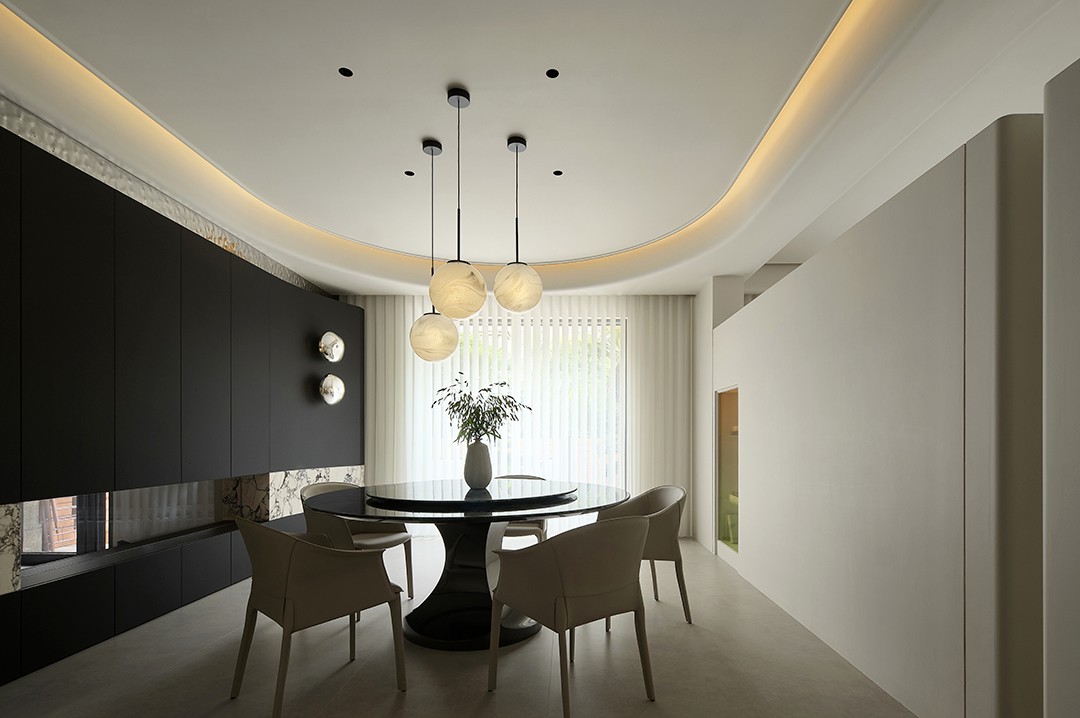House of Air Mark Horton
2011-08-27 00:00
架构师提供的文本描述。“空中之家”由两位对动作体育界感兴趣的年轻企业家于2010年创办,是一家蹦床设施,迎合旧金山活跃、精力充沛、富有的年轻人的歧视口味。这座令人叹为观止的景点位于金门大桥脚下和金门国家公园,开阔的视野延伸到旧金山湾,当45英尺宽的玻璃吊架门打开时,景色就更加明显了。在这架具有历史意义的双面吊架内,一条用于弹跳的大场地蹦床沿着一边坐着,一边是蹦床,一边是躲避球场,三种性能蹦床,既用于比赛跳跃,也用于滑雪/滑雪板/尾板训练。蹦床区的两侧是两个展馆,设有咖啡厅、会议设施、储物柜和休息室。半透明的蓝色墙壁从内部照明是垂直运动的图形解释,发生在整个设施。
Text description provided by the architects. House of Air, started in 2010 by two young entrepreneurs interested in the action sports world, is a trampoline facility that caters to the discriminating taste of the young, energetic and affluent population of active San Francisco. The breathtaking site is at the foot of the Golden Gate Bridge and in the Golden Gate National Park, with expansive views out to the San Francisco Bay that become even more apparent when the 45' wide glazed hanger door is opened. Inside the historic biplane hanger, a large field trampoline for bouncing sits along side a trampoline dodge ball court and three performance trampolines used for both competitive jumping as well as ski / snowboard / wakeboard training. Flanking the trampoline area are two pavilions housing a café, meeting facilities, lockers, and a lounge. Translucent blue walls lit from within are graphic interpretations of the vertical motion which takes place throughout the facility.
客户最初的目标纯粹是建造和运营一个能够容纳他们的业务计划的设施。建筑师的目标是创造一个空间,以视觉的方式作为一个品牌装置,从而将本来可以成为基础商业体验的东西提升到与复杂的网站和客户相匹配的水平。通过使用相对便宜的建筑材料和方法,最终产品是一种独特的环境,为来访的客户留下了持久的视觉印象。
The client’s original objectives were purely to construct and operate a facility that could accommodate their business plan. The architect’s objectives were to create a space that would act as a branding device in a visual manner, thus elevating what could otherwise have been a base commercial experience to a level matching the sophisticated site and clientele. Through the use of relatively inexpensive construction materials and methods, the final product is a distinctive environment that registers as a lasting visual impression on visiting customers.
© Jeremy Wong and Mark Horton / Architecture
在建筑上,吊架仍然是一个大的大跨度结构,其中安装了独立的元素。这座建筑的一端有一个非常大的双层玻璃门,正对着历史悠久的克里斯西机场(Crissy Field)跑道、远处的旧金山湾(San Francisco Bay)和旧金山市中心。在内部,这座巨大的天窗两侧是结构独立的亭子,里面有离散的方案元素,覆盖着半透明的蓝色聚碳酸酯。这些墙的大开口是通过旋转板来调节的,以提供室内房间的隐私。连接楼阁上层的结构钢T台,允许高耸的有利位置,从那里可以观察下面蹦床的活动。
Architecturally, the hanger remains a large single long-span structure, with free-standing elements installed within it. A very large glazed overhead bi-fold door at one end of the building fronts onto the historic Crissy Field landing strip, the San Francisco Bay beyond, and downtown San Francisco in the distance. Internally, this large oculus is flanked by structurally-independent pavilions housing discreet programmatic elements, clad in translucent blue polycarbonate. Large openings in these walls are modulated with pivoting panels, to provide privacy to the interior rooms. A structural steel catwalk connecting the upper floors of the pavilions allows for elevated vantage points from which to observe the trampoline activity below.
© Ethan Kaplan Photography and Mark Horton / Architecture
对现有的历史吊架进行翻新和改造并不是一项小任务。现有建筑为轻钢结构,位于天然填埋场上,易在地震带液化。当6英寸厚的实心混凝土屋面结构(按照1920年的标准防弹!)添加到方程中,并要求在地震震动时保持在适当的位置,很快就可以看出该建筑需要大量的支撑和升级。将地震升级与建筑的历史要求相结合是一个重大挑战;灌浆-注入混凝土,使原来的混凝土保持原状,并再次变得结构完好,将新工程的结构荷载与历史结构分开,并以尊重最初设计的历史结构的方式向原建筑物增加结构构件,这些都是设计和施工小组必须处理的任务。
The renovation and remodeling of the existing historic hanger was no small task. The existing building is a lightweight steel structure sitting on natural landfill prone to liquifaction in a seismic zone. When the six inch thick solid concrete roof structure (bomb-proof by 1920’s standards!) is added to the equation, and required to be kept in place during seismic shaking, it becomes quickly apparent that the building was in need of significant bracing and upgrade. Combining the seismic upgrade with the historic requirements of the building was a significant challenge; grout-injecting concrete to allow the original concrete to remain in place and once again become structurally sound, separating structural loads for the new work from the historic structure, and adding structural members to the original building in a way that would respect the historic structure as originally designed, were all tasks which the design and construction team had to address.
© Ethan Kaplan Photography and Mark Horton / Architecture
除了稳定现有结构外,还花费了大量时间和精力解决有毒问题。一个飞机吊架,由军方拥有近90年,只能被认为是有毒的。铅油漆、航空燃料和石棉似乎在项目开始时出现在建筑物的几乎每一个表面。一项解决所有这些情况的综合计划,加上总承包商的大量工作,最终导致了一座最终的、可用的、干净的公共建筑。
In addition to stabilizing the structure in place, a large amount of time and energy was spent addressing toxic concerns. An airplane hanger, owned by the military for almost 90 years, can only be assumed to be toxic. Lead paint, aviation fuel, and asbestos seemed to be present on almost every surface of the building at the start of the project. A comprehensive plan to address all of these conditions, with a tremendous amount of work on the part of the general contractor, resulted in a final, usable, and clean, public building.
Courtesy of Mark Horton / Architecture
由于所做的工作,一座历史建筑被重新设计并重新投入使用,由国会成立的普雷西迪奥信托(Presidio Trust)是一个实体,目的是保护主席团的自然、风景、文化和娱乐资源,并以一种能够使它们在财政上自给自足的方式来塑造它们。
As a result of the work performed, an historic building was re-purposed and put back into use for The Presidio Trust, the entity formed by Congress to both preserve the Presidio’s natural, scenic, cultural, and recreational resources, and to shape them in a way that would allow them to become financially self-sufficient.
© Ethan Kaplan Photography and Mark Horton / Architecture
 举报
举报
别默默的看了,快登录帮我评论一下吧!:)
注册
登录
更多评论
相关文章
-

描边风设计中,最容易犯的8种问题分析
2018年走过了四分之一,LOGO设计趋势也清晰了LOGO设计
-

描边风设计中,最容易犯的8种问题分析
2018年走过了四分之一,LOGO设计趋势也清晰了LOGO设计
-

描边风设计中,最容易犯的8种问题分析
2018年走过了四分之一,LOGO设计趋势也清晰了LOGO设计




























































































































